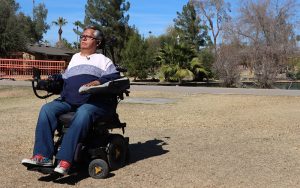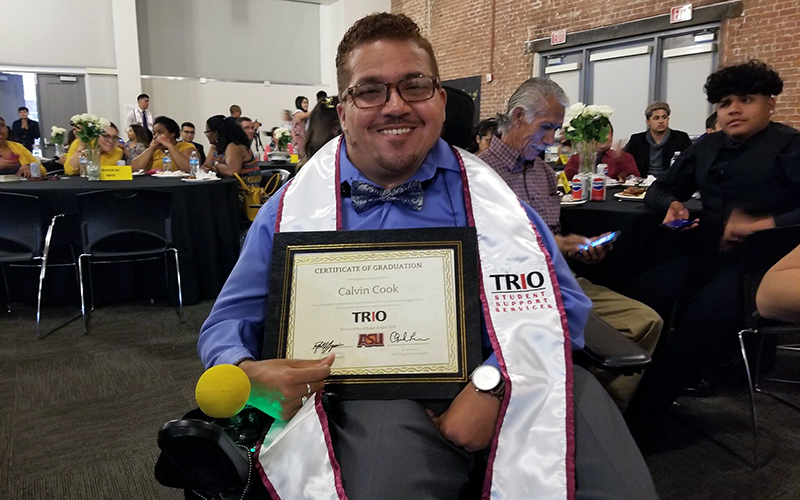PHOENIX – Arizona Republicans who still reject the outcome of the 2020 presidential race introduced a spate of election reform bills this legislative session that would restrict voting access – including some that opponents argue could disenfranchise voters with disabilities.
Many of those bills have died, though one that would ban mail-in voting for most Arizonans was revived in committee Monday. Also pending is Senate Bill 1058, which would prohibit drive-up voting and curbside drop boxes. The bill passed committee and is awaiting consideration by the full Senate.
The measure includes an exemption for those with disabilities, but critics said it would be of little use because the American with Disabilities Act precludes elections officials from inquiring about a person’s disability.
“Our biggest challenge with this is … we’re not allowed to ask people what their disability is,” Jennifer Marson, executive director of the Arizona Association of Counties, said at a Feb. 10 Senate Government Committee hearing. “So we’re not sure how we could comply … but also not be in violation of ADA.”

George Garcia is executive director of the Southwest Institute for Families and Children, which serves people with disabilities and their families. His group and others oppose a Senate bill that would ban drive-up voting and curbside drop boxes. (Photo by Troy Hill/Cronkite News)
Marson added that ballot drop boxes are a valuable service.
“They’re an alternative to voters, especially those who are wary of the post office, and we do have many of those voters in Arizona,” she said. “And the point of the drop box is to be outside the main office so that it is more convenient for voters.”
Disability rights advocates said any measure that restricts voting has the potential to disenfranchise voters with disabilities.
“Looking at some of these bills, it’s really important to ask the question of, ‘Does this legislation allow them to vote as independently as possible?’” said Gina Roberts, voter education director at the Arizona Citizens Clean Elections Commission.
George Garcia, 39, has been paralyzed since age 12 because of a spinal tumor. He uses a power chair, but with that comes complications at polling stations. He has permanent early voting status and votes by mail, which Arizona has allowed without requiring a reason for three decades.
“A lot of people with disabilities are not able to get to polling stations. They lack transportation, or they may not have the ability to wait in line for a long time,” said Garcia, executive director of the Southwest Institute for Families and Children, a Phoenix nonprofit serving people with disabilities and their families.
More than 1.5 million adults in Arizona, or 1 in 4 people, have a disability related to mobility, cognition, vision, hearing or health conditions, according to the Centers for Disease Control and Prevention. Nationally, 61 million adults live with some type of disability.
Rutgers University’s Program for Disability Research, which tracks voting by those with disabilities, found that in the 2020 election, one-sixth of the nation’s eligible voters had a disability, and nearly 18 million people with disabilities voted.
Of those who cast ballots, the study said, nearly 2 million people experienced some kind of difficulty with the process, such as standing in line, entering a polling place or reading a ballot.
Joe Biden’s defeat of Donald Trump in the presidential election, which included narrow victories in the longtime Republican strongholds of Arizona and Georgia, quickly prompted claims and conspiracy theories of a stolen election. Although state and federal elections officials, the Justice Department and rulings in more than 60 lawsuits determined the 2020 election was free of major, widespread fraud, proposals to change the electoral process have swept Republican-led legislatures across the country.
From January 2021 through December, 19 states passed 34 laws restricting access to voting, according to the Brennan Center for Justice. These include limits on mail-in ballots, new voter identification requirements, reducing the number of polling places or hours they’re open, and limiting early voting.
A July 2021 report by the left-leaning Center for American Progress found that such laws often are meant to target people of color but also prevent people with disabilities from voting.
“Policymakers must work closely with voters and advocates representing varied disabilities and interests to determine all the ways that existing election systems are inaccessible,” Mia Ives-Rublee, director of the center’s Disability Justice Initiative, said when the report was released.
“There must be a sense of urgency to fix these problems before the next major election.”
A provision of the 1990 American with Disabilities Act requires state and local governments to ensure that people with disabilities have an equal opportunity to vote.
Beyond that, the federal Help America Vote Act of 2002 and the ensuing Protection and Advocacy for Voting Access program, or PAVA, work to ensure that all polling locations during federal elections have at least one accessible voting system.
Asim Dietrich, an attorney with the Arizona Center for Disability Law, helps implement PAVA in Arizona.
“Under that program, we educate voters with disabilities about their rights and registering to vote,” he said. “We also educate policymakers on how various policy changes could affect voters with disabilities and whether certain policy changes could make it more difficult for voters with disabilities.”
Dietrich, 39, was diagnosed with muscular dystrophy at age 2. Unable to move his arms or legs, he relies on a power chair and a ventilator to assist with breathing.
“I’ve utilized mail-in voting since it’s been available in Arizona because that’s really been the best and most accessible way for me to vote both privately and independently, which is a right that our voters have,” he said.
In March 2021, President Biden issued an executive order ordering federal agencies to develop strategies to improve access to voting to prevent discrimination based on race, ethnicity, disability or other factors.
In response, the National Institute of Standards and Technology issued a draft report outlining barriers for disabled voters and proposed solutions. Those include more outreach to help state and local jurisdictions understand expectations around accessible voting and ensuring that people with disabilities can vote in person using a paper ballot or an accessible voting machine.
Organizations like Garcia’s are among those working to educate both lawmakers and the public about how bills such as SB 1058 can affect not just those with disabilities – but all voters.
“People who use drop-off or mail-in ballots do not necessarily have to have disabilities or something that’s medically diagnosed,” Garcia said. “There’s a large portion of our population … that are not able to go and vote within the hours of our voting precinct.
“Taking away those options is going to reduce the ability of people to vote.”





